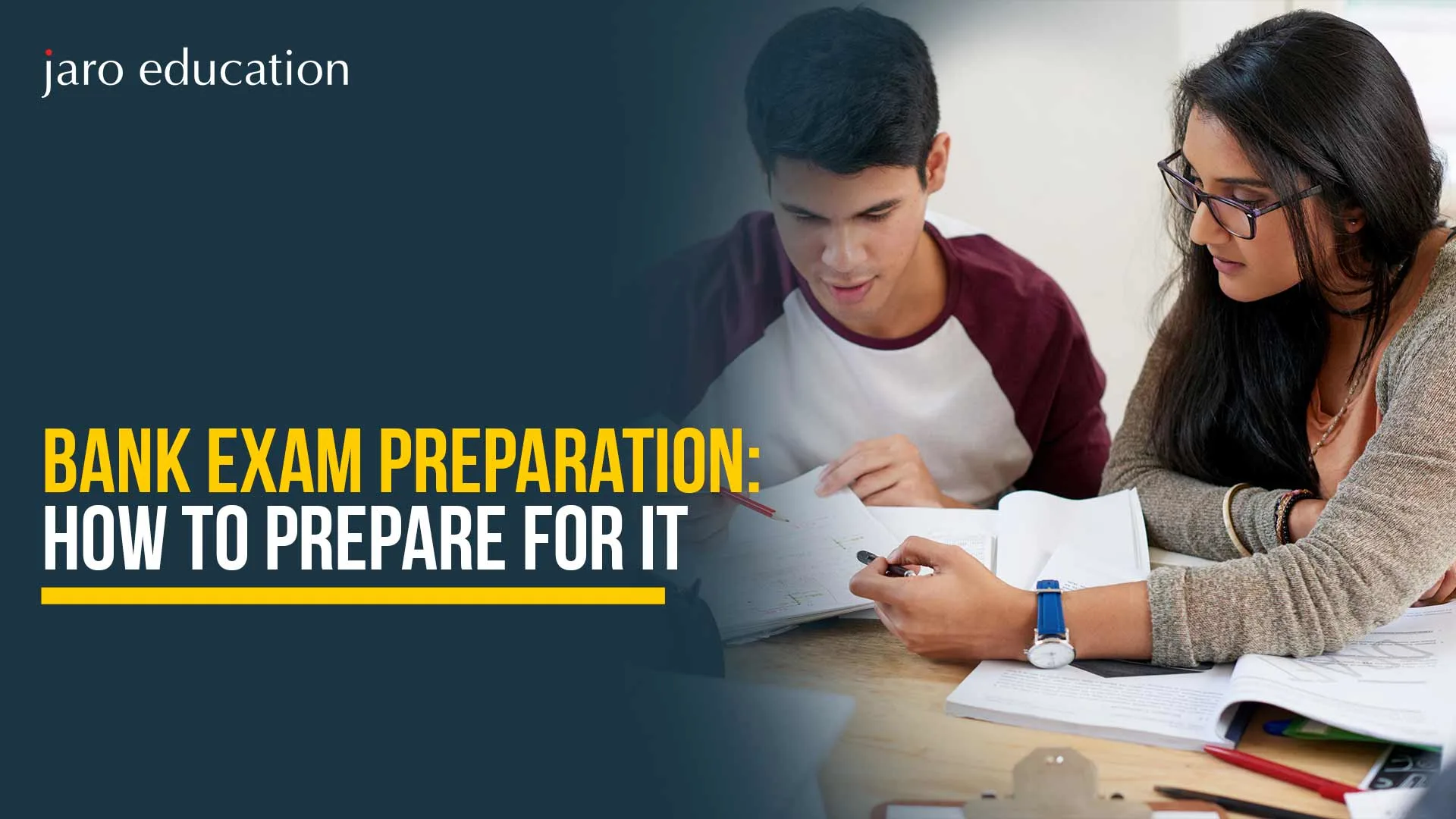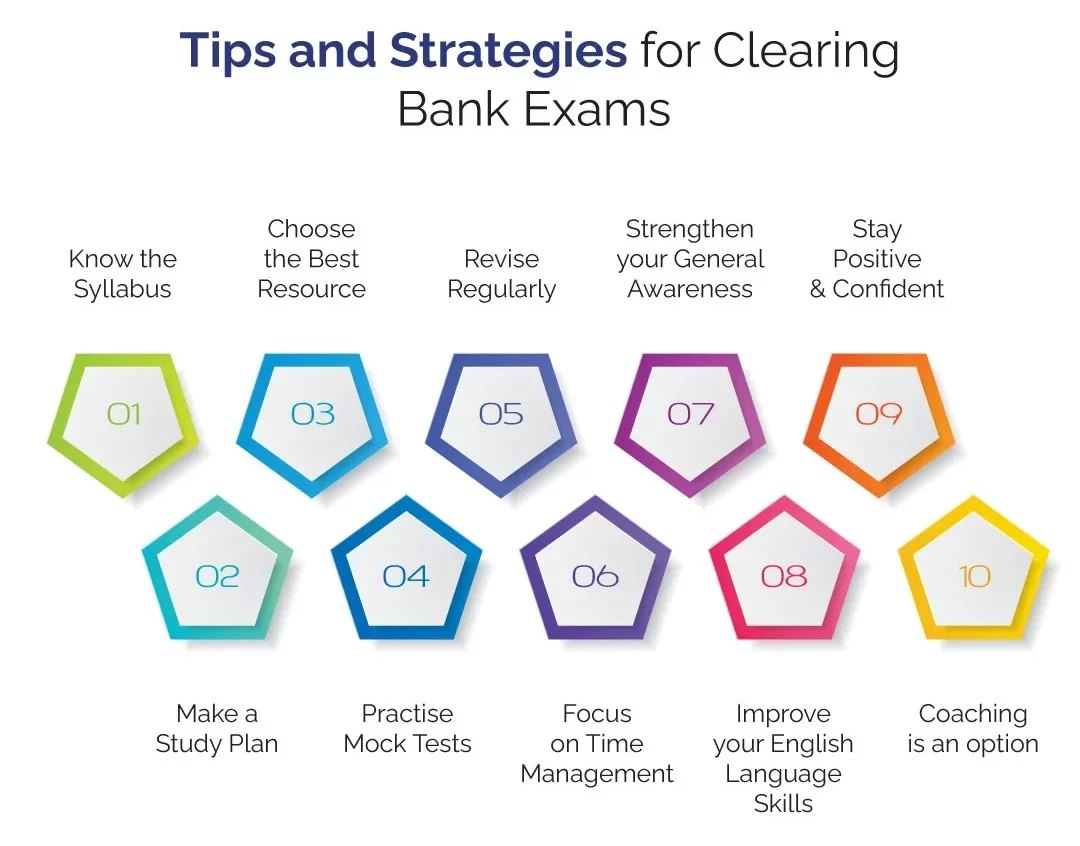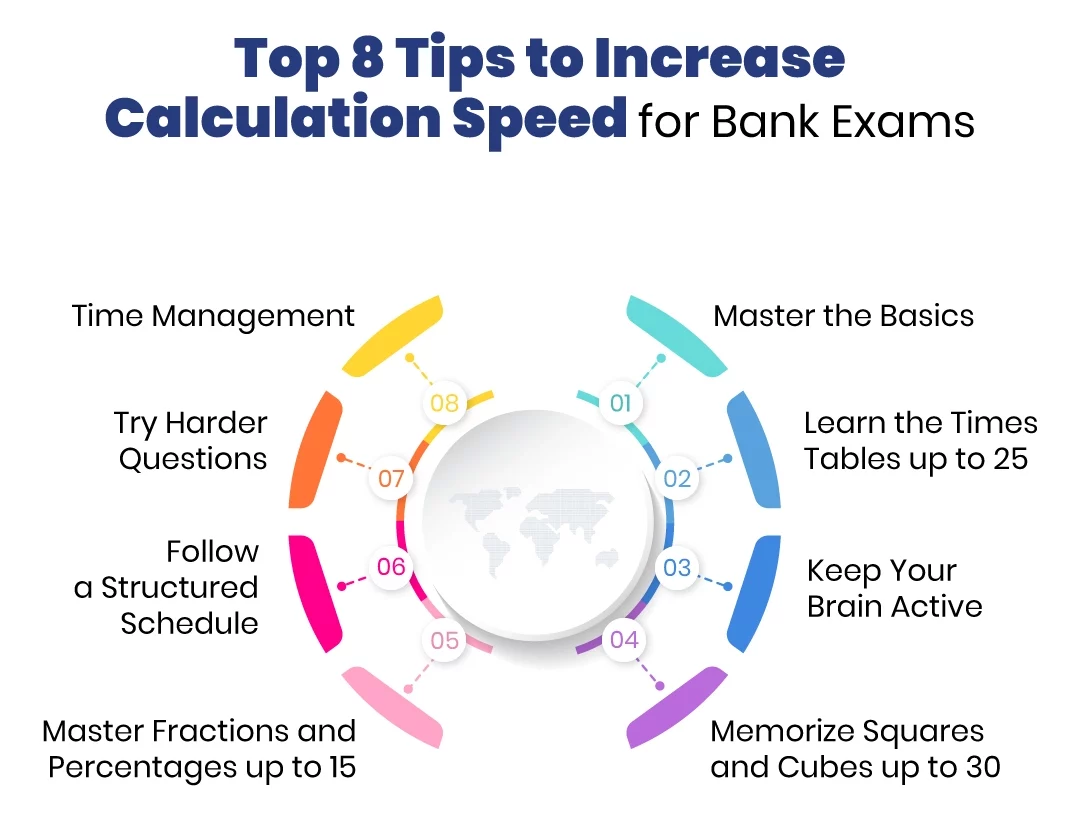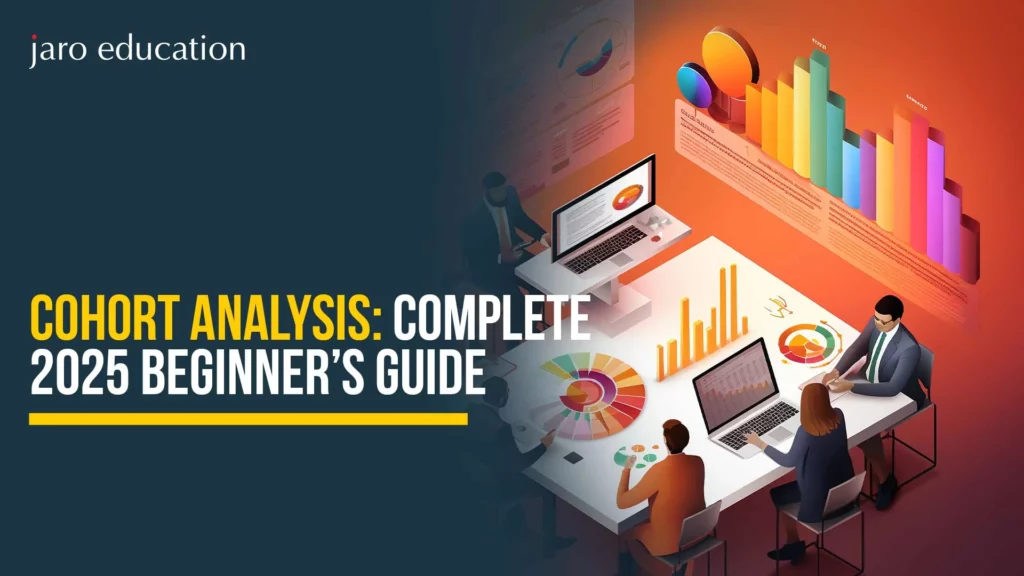Bank Exam Preparation: How to Prepare For it
Table of Contents

Banking jobs have always had an image of stability, respect, and development. Lakh of candidates appear for competitive banking examinations annually with the aspiration of getting employed in prestigious public sector and private sector banks. But the journey isn’t easy.
Bank exam preparation is not merely hard work but also an organized approach that includes covering the extensive syllabus, developing conceptual understanding, and enhancing time management.
If you are serious about bank exam preparation, this guide will take you through it all, starting with how to get cracking with the syllabus to selecting the correct bank exam preparation books and lastly executing the strategies that truly work.
Understanding the Syllabus of Bank Exam
Any competitive exam process begins with cracking the syllabus. Without it, preparation tends to get dispersed and ineffective.
Following is a division of the typical bank exam syllabus adopted throughout exams such as IBPS PO, SBI PO, RBI Assistant, and so on:
- Quantitative Aptitude: Approximation, simplification, data interpretation, quadratic equations, arithmetic questions.
- Reasoning Ability: Coding-decoding, puzzles, seating arrangement, syllogism, blood relation, inequality.
- English Language: Error spotting, fill in the blanks, cloze test, para jumbles, reading comprehension.
- General Awareness: Static GK, banking awareness, current affairs (last 6 months are important).
- Computer Knowledge: Basics of MS Office, internet, networking, and basic computer terminology.
With thorough knowledge of the syllabus, you can decide how to use your time effectively and spot their weak spots early on, making your bank exam preparation stronger.
How to Prepare for Bank Exams: Step-by-Step

*finprov.com
Now that the syllabus is transparent, cracking bank exam preparation itself is the big challenge in a manner that ensures success. Here is a systematic approach:
1. Prepare a Realistic Study Plan
Rather than random study hours, plan a schedule that addresses every topic of the exam. Divide your stronger and weaker areas equally so that none of the topics is neglected. A planned schedule is the cornerstone of intelligent bank exam preparation, providing steady progress.
2. Reinforce the Fundamentals
Bank exams examine basics, particularly reasoning and quantitative aptitude. Speed and accuracy are compromised without conceptual clarity. Spend time learning basics prior to trying shortcuts. Well-developed fundamentals enhance your bank exam preparation and minimize last-minute confusion.
3. Practice Mock Tests
Mock tests are a must. They mimic actual exam pressure, identify your weak areas, and enhance time management. Review your performance after each test to measure improvement. Practice regularly is what brings bank exam preparation to actual exam preparedness and confidence.
4. Employ the Correct Bank Exam Preparation Books
Choosing good bank exam preparation books is just as crucial as studying. Suggested ones are:
- Quantitative Aptitude by R.S. Aggarwal
- A Modern Approach to Verbal & Non-Verbal Reasoning by R.S. Aggarwal
- Word Power Made Easy by Norman Lewis (for vocabulary)
- Lucent’s General Knowledge
- Banking Awareness by Arihant Experts
All these materials, along with online test series, provide a solid foundation to your bank exam preparation with depth and practice.
5. Current Affairs Prioritization
Banking exams place substantial emphasis on contemporary events, particularly economy, banking reforms, and government policies-related. Make it a daily routine to read newspapers, financial magazines, and reputable online sites. Keeping oneself updated with current affairs enhances overall bank exam preparation and increases your general awareness score.
6. Revising Regularly
Revision is given less importance. Prepare small notes and refer to them from time to time so facts and formulas are etched in your mind.
7. Solve Previous Year Papers
Solving previous year question papers provides you with a real sense of the exam pattern, difficulty level, and topics which are repeatedly asked. It also gives you an insight into areas where examiners give more emphasis. Develop the habit of attempting at least the previous 5 years’ papers in timed situations.
8. Improve Speed and Accuracy Combined
In bank exams, speed alone is not enough, every wrong answer can cost marks due to negative marking. Practice solving questions with a balance of speed and accuracy. Use shortcuts only after mastering the basics to avoid careless mistakes.
9. Take Sectional Tests Seriously
As bank exams contain sectional cut-offs, you cannot opt to be extremely good in one subject and neglect another. Try for regular sectional tests of reasoning, quantitative aptitude, and English separately. This avoids the situation where any single section proves to be a hindrance to clearing prelims or mains.
Time Management During Bank Exam Preparation
One of the most neglected topics of bank exam preparation is time management. Candidates tend to spend several hours on subjects they enjoy but neglect the tough ones. This can result in loss of marks in the real exam.
Practical advice is:
- Split your study timings: 2 hours quantitative, 2 hours reasoning, 1 hour English, and so on.
- Adopt the Pomodoro technique (25 minutes of study + 5 minutes of break).
- Make weekly goals rather than ambiguous monthly goals.
- Keep in mind that the exam is as much a test of speed as it is of knowledge.
How to Remain Motivated During Bank Exam Preparation
Preparation for a bank exam can be mentally draining, particularly with serial attempts. Remaining motivated is as crucial as preparation itself. Here’s how:
- Make small, achievable goals to gain momentum.
- Participate in online study groups to remain accountable.
- Treat yourself after finishing weekly goals.
- Remind yourself of the larger picture: a secure banking career.
Motivation is not being pumped up daily; it’s developing discipline that keeps you going even on low-energy days.
Last-Minute Preparation Tips for Bank Exams

*finprov.com
As you near the exam date, emphasize clever revision over new material. Below are a few speedy tips:
- Revising important notes and formulas daily rather than doing a cram session.
- Practice 1–2 timed mock tests to remain exam-prepared without tiring yourself out.
- Prioritize accuracy over speed to ensure no negative marking.
- Polish strong subjects for a higher score cushion.
- Sleep well and remain relaxed, a refreshed mind does better than a tired one.
- Have documents ready (admit card, ID proof, stationery) to escape last-minute tension.
How Jaro Education Can Help You Move Ahead in Banking Career
For most, bank exam preparation is the logical first step towards establishing a stable and respected career. Passing exams such as IBPS or SBI PO can lead the way to public sector banks, where recognition and steady growth are guaranteed.
But the financial world is much larger than government banking. If you’re someone already working in the sector, or even if you’re just exploring opportunities in private banking, corporate finance, or investment banking, you’ll quickly realize that growth depends on more than just clearing exams, it demands continuous learning and sharper skills.
That’s precisely where Jaro Education steps in. Through the selection of industry-apt programmes, it ensures that ambitious learners remain future-proof. The Professional Certificate Programme in Investment Banking – IIM Kozhikode is one of them.
This 10-weekend, 10-month course, led by IIM professors and finance practitioners, combines theory with practical application. From corporate finance and valuation to mergers and acquisitions, and portfolio management, it gets you ready to handle intricate financial responsibilities with ease. Adding case studies, simulations, and a capstone project, you are not only learning concepts but implementing them.
So, whether you’re an aspirant preparing for exams, a young banker seeking growth, or a professional aiming to transition into private finance, Jaro Education can be your stepping stone to a bigger, more rewarding career path.
Conclusion
At the end of the day, success in bank exam preparation comes down to consistency, smart planning, and the ability to stay calm under pressure. Knowing the syllabus of the bank exam, referring to appropriate bank exam preparation books, and self-practicing through mocks and old papers are the non-negotiables that no candidate can and should do without. Added to this, staying motivated and being smart with time will help your hard work pay off on exam day.
But do not forget, cracking the exam is only the first step. The financial industry is constantly evolving, and opportunities extend much wider than the banking sector. That’s why sites like Jaro Education are so important. With courses like the Professional Certificate Programme in Investment Banking – IIM Kozhikode, you are able to stretch your career reach and develop skill sets in corporate finance, valuation, and investment banking.
Frequently Asked Questions
How long do I need for efficient bank exam preparation?
There is no pre-decided time as it varies according to your existing level of preparation. Around 6–8 months of dedicated study, practice every day, and regular mock tests are enough for bank exam preparation.
What are the top bank exam preparation books which I can begin with?
Some of the top-recommended books are Quantitative Aptitude by R.S. Aggarwal, Word Power Made Easy by Norman Lewis, and Banking Awareness by Arihant Experts. These along with the mock papers constitute the basis of robust bank exam preparation.
How to prepare for bank exams while working full-time?
If employed, you will require a disciplined routine. Work 2–3 hours on weekdays and extended sessions on weekends. Work on high-weightage topics in the bank exam syllabus and use brief notes and mock tests to work efficiently.
Is coaching required for bank exam preparation?
Not always. Most applicants pass exams on their own with the help of regular bank exam study guides and test series. Coaching, however, can bring order, expert advice, and peer-to-peer learning if you are not satisfied with self-study.












![Things-You-Need-to-Know-about-Investment-Banking-[Updated]](https://jaro-website.s3.ap-south-1.amazonaws.com/2025/08/Things-You-Need-to-Know-about-Investment-Banking-Updated.webp)




